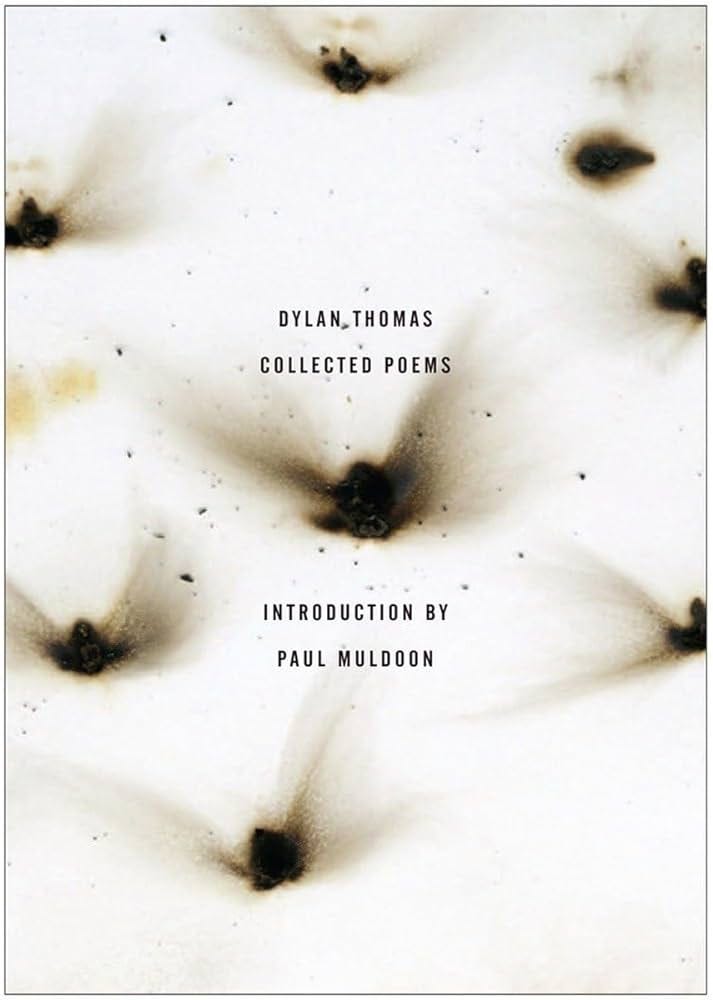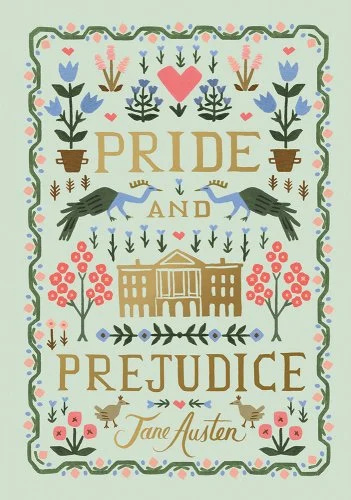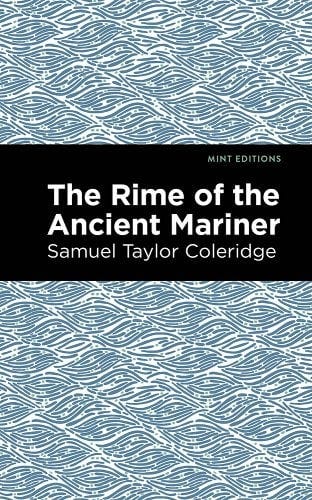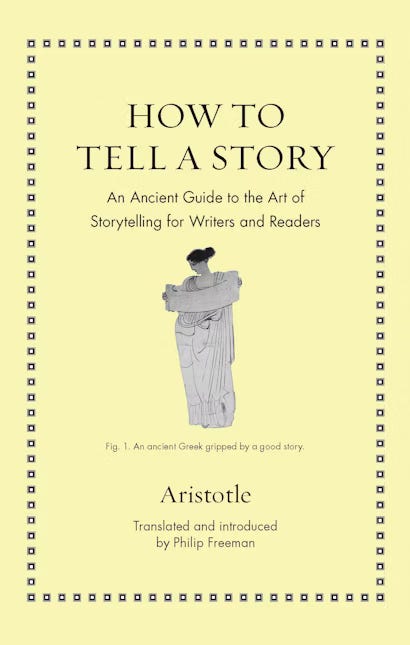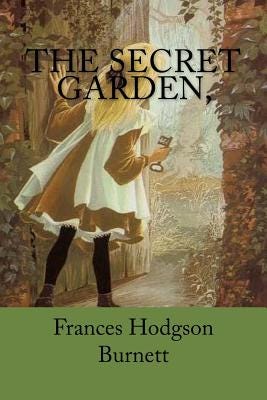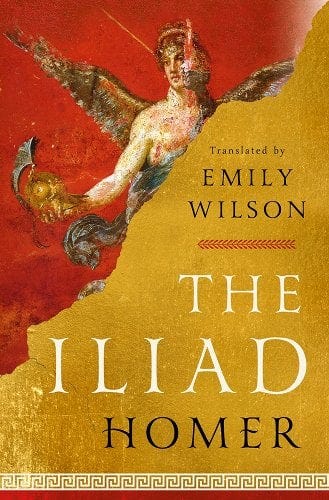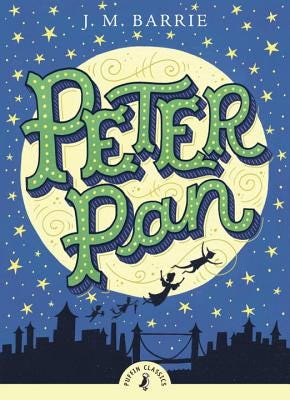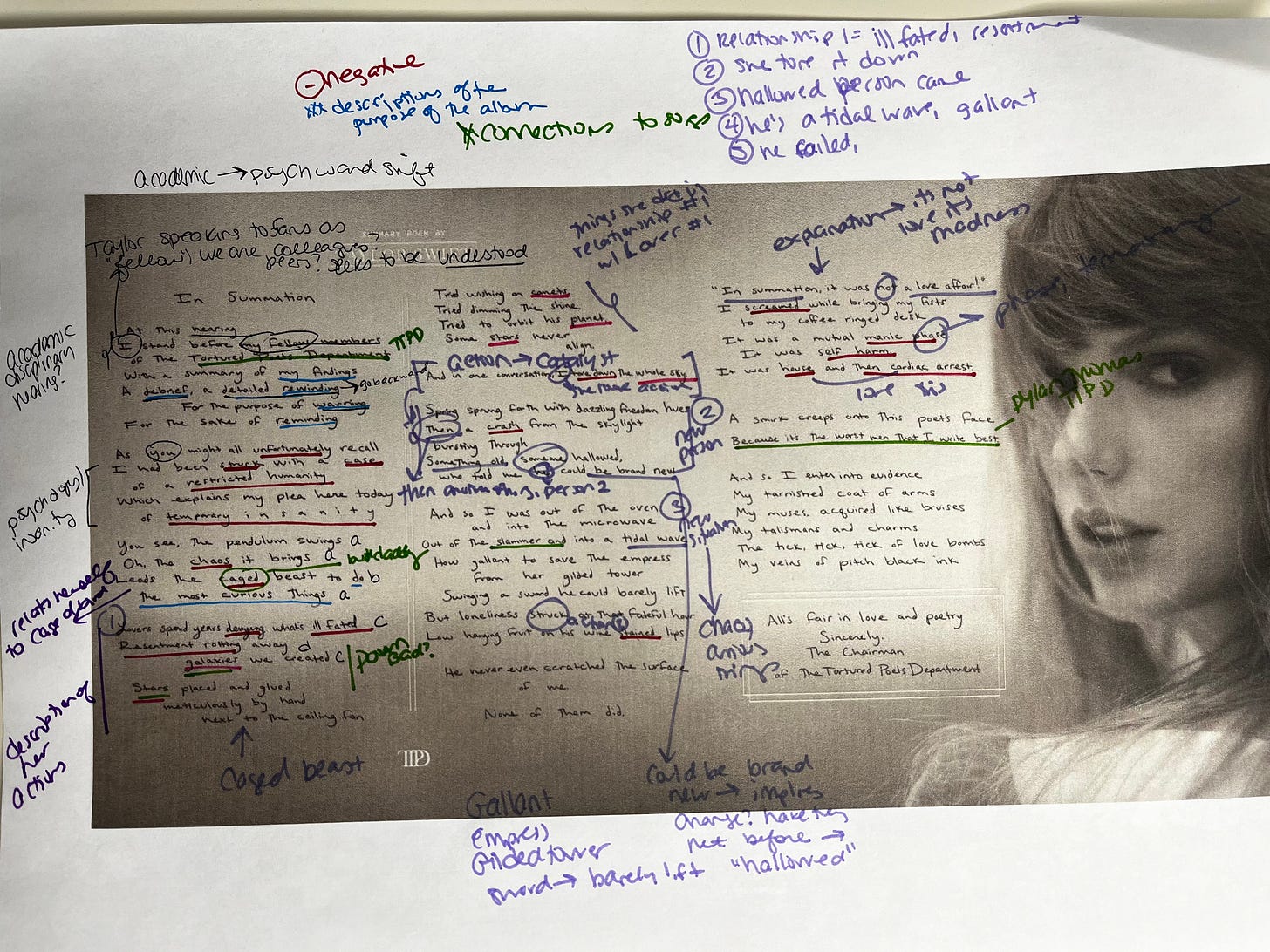Taylor’s long-awaited album The Tortured Poets Department is officially out, and of course, we have thoughts! We dropped a special bonus episode to bring you as comprehensive of an overview as we can in one (rather long) episode. Be warned: you won’t find speculation about Taylor’s love life here. True to our usual content, we focus on the lyrics, the themes, and the literary choices Taylor makes to understand what this album is all about. Join us as we give our first reactions, talk about Taylor’s “In Summation” poem, and briefly dissect a handful of songs that stood out to each of us.
📚 Your Tortured Poets Reading List
We’d argue Taylor has always been in her Literary Era (we are a podcast that does literary analysis of Taylor Swift’s lyrics, after all!) But with The Tortured Poets Department, Taylor has released her most explicitly literary album to date. We put together a special Bookshop Booklist with reads for her most explicit references and some we’re inferring based on a deeper reading.
Dylan Thomas, Collected Poems
Track 2: “The Tortured Poets Department”
This one is an explicit lyric reference: You’re not Dylan Thomas / I’m not Patti Smith / This ain’t the Chelsea Hotel / We’re modern idiots. Thomas, author of "Do not go gentle into that good night,” may also be referenced in Taylor’s “In Summation” poem (see extra credit below) when she says “But it’s the wildest men I write best,” paralleling Thomas:
Wild men who caught and sang the sun in flight,
And learn, too late, they grieved it on its way,
Do not go gentle into that good night.
Jane Austen, Pride and Prejudice
Track 6: “But Daddy I Love Him”
This is a song about not caring about other people’s judgments about your relationship. It wouldn’t be an AP Taylor Swift analysis without a Pride and Prejudice reference, and this song screams Lydia! You can just imagine her running away with Wickham saying “there’s a lot of people in town that I /Bestow upon my fakest smiles / Scandal does funny things to pride / It brings lovers closer”
Samuel Taylor Coleridge, The Rime of the Ancient Mariner
Track 19: “The Albatross”
This reference gets an entire song title, not just a lyric! Rime of the Ancient Mariner is a well-known poem recounting “the misfortunes of a seaman who shoots an albatross, which spells disaster for his ship and fellow sailors.” In the song, Taylor similarly recounts a story shared by “wise men,” this time relating herself to the Albatross, albeit with a twist at the end.
Aristotle, How to Tell a Story
Track 22: “So High School”
Another direct reference, “You know how to ball, I know Aristotle.” When I tell you I CACKLED hearing this lyric!
Frances Hodgson Burnett, The Secret Garden
Track 23: “I Hate It Here”
This one is potentially a direct reference, although the lyric (“I hate it here so I will go to / Secret gardens in my mind”) isn’t “The Secret Garden,” capitalized, so there’s room for interpretation. However, the lyric continues “I read about it in a book when/ I was a precocious child” so I feel pretty confident that this is a direct reference.
Homer, The Iliad
Track 27: “Cassandra”
Cassandra references the story of Cassandra, a Trojan Priestess who foretold the Trojan War, only to have everyone dismiss her warnings. It’s a very minor story in The Iliad, however, here Taylor uses this story as a metaphor for something she warned others about, but was ignored for, only to be right in the end. If you’d like my thoughts on what this song is about, leave a comment!
JM Barrie, Peter Pan
Track 28: “Peter”
The Anthology part of the album seems to be where the meaty literary references are, aren’t they!? Peter uses the story of Peter Pan as an extended metaphor, likley for a relationship with someone who refuses to grow up. Like many of the literary references Taylor uses, this one helps her share context that’s important to the song without having to waste precious lyrical space to describe the person she’s talking about. Calling him “Peter” and making references like “My lost fearless leader,” “You said you were gonna grow up,” and “Lost to the lost boys chapter of your life,” means we have the entire context of JM Barrie’s story (or the beloved Disney movie) to understand who the character is.
This Week’s Extra Credit - Brought to you by Jodi
This post is getting long, but I want to give you a little glimpse into my annotation and analysis of Taylor’s “In Summation” poem found on the album. If you didn’t get a physical copy of the album you may not even know this exists, so here you go!
The poem is basically the thesis of the entire anthology. 31 songs is a lot of album to listen to—we’re essentially listening in to Taylor’s journal from this period of her life. The poem is a 2-minute summary of a 2-hour and 2-minute album, the Spark Notes or cheat sheet or study guide of the album, if you will.
Taylor starts by speaking directly to her “fellow members of the Tortured Poets Department,” equating her listeners to her peers or colleagues. We learn that this album is a “summary” and a “hearing” where she’ll “debrief,” in “detail” what happened. When did it happen? We’re not quite sure. But whatever happened, she doesn’t want it to happen again—this album is a “warning.” Whatever it is, it feels like an academic disciplinary hearing where the person at fault gets to share their side of the story.
So what happened that requires a hearing? In her own words, she was “struck with a case of restricted humanity” leading to “temporary i n s a n i t y.” Here we start to get glimpses of the psych ward imagery used in the Fortnight video. Whatever happened to her, she equates it to a psychological breakdown.
So what happened? “The pendulum swings,” an equilibrium shifted and caused chaos. She describes herself as a “caged beast,” possibly a reference to “I just learned these people only raise you to cage you” from But Daddy I Love Him. As a caged beast, she did “curious things,” presumably the things that she needs to reflect on in this hearing.
From here we get the main action, with more references to the songs that connect to each situation. We have an “ill-fated” relationship, with “resentment” (So Long London, “Holding tight to your quiet resentment”), where “galaxies” were created but “some stars never align,” causing her to end it “in one conversation, I tore down the whole sky”
After this relationship, she “sprung forth with dazzling freedom hues,” free from the ill-fated relationship and straight into “something old, someone hallowed”, echoing the phrase “something borrowed, something blue” often heard in weddings. Someone from her past came back, potentially with the hope of marriage, but it may not be a good thing—this new change is quickly described as a “crash,” which is not the best start to a relationship.
We see things crash down further quite quickly, “out of the oven and into the microwave,” suggesting that while her previous ill-fated relationship was heated, this new one heated up even faster. She went “out of the slammer” (see Fresh out the Slammer) and “into a tidal wave,” still dangerous, but more wild and unpredictable. This new relationship was not what it seemed— “swinging a sword he could barely lift,” this new person could not save her even though he said he could. “He never even scratched the surface” we learn. But more than that, we learn “none of them did,” suggesting she’s reflecting on the emotions and experiences of both relationships at the same time. “None of them did” starts to connect the people in her past together, instead of inspecting and evaluating them one by one.
This experience, she “screamed” was “not a love affair,” it was a “mutual manic phase,” meaning both, or all, individuals involved were temporarily afflicted with the same moment of reckless abandon. “It was self harm” she admits, acknowledging she put herself in the “tidal wave” and the “microwave”. “It was house and then cardiac arrest,” illustrating she went from being holed up in her home, to feeling a sudden, unexpected loss of consciousness and loss of control of her own emotions.
And then she breaks the 4th wall, “A smirk creeps onto this poet’s face / Because its the worst men that I write best.” First, we have a reference to Dylan Thomas’s poem Do Not Go Gently Into That Good Night, with Dylan Thomas also referenced in The Tortured Poets Department (“You’re not Dylan Thomas/ I’m not Patti Smith). Second, we have perhaps the most Taylor Swift moment ever—she’s acknowledging that as chaotic and painful as these experiences have been, she can use them to do what she does best, which is write about these painful memories, these “worst men.”
The final stanza is the same one we saw when she announced The Tortured Poets Department, but we didn’t know what it was. Now we know it’s an ending, not a beginning. Everything we see on this album is “evidence.” It’s her armor, however worn (“tarnished coat of arms”). It’s her inspiration, however painful (“muses acquired like bruises”). It’s things that brought her good luck, her magic, her experiences, her memories, and everything that makes up who she is, down to her “veins of pitch black ink.”
And So I Submit Into Evidence...Preparing for "The Tortured Poets Department"
If you are subscribed to this substack, it is probably fairly safe to assume that you are aware that this past Sunday we were blessed by Miss Taylor Alison Swift when she announced her upcoming eleventh studio album, The Tortured Poets Department. Not only did she announce it, she dropped the album front, album back cover AND an incredible handwritten p…
This is an album Taylor had to make for herself, not for anyone else. It’s clear from this poem, and even more clear from the 31 songs on the album, that this was her way of processing a period in her life that made her feel like “temporary insanity”. She’s here to explain what happened, how she felt, and what she experienced. We’re here to benefit from her process of processing.




